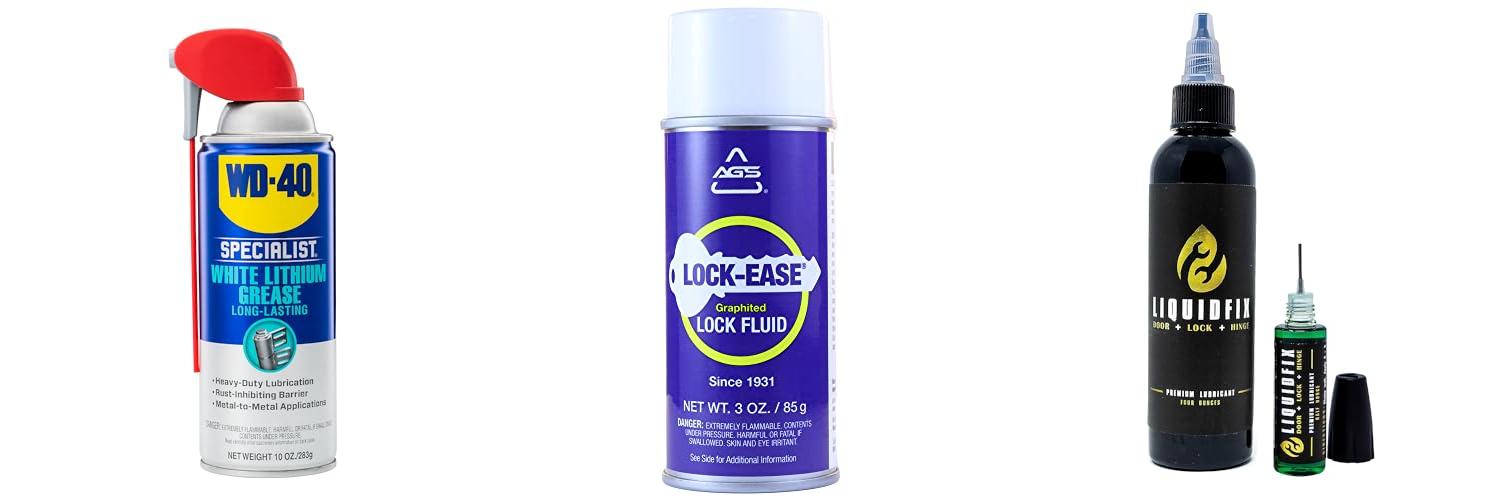Remember the frustration of a car door that won’t open? The jiggling, the key bending, the sheer panic when you’re locked out! It’s a problem we’ve all faced, and it usually comes down to one thing: a sticky car door lock. But what if you could avoid that whole mess? Choosing the right lubricant for your car door locks can prevent these headaches and keep your car running smoothly.
Finding the best lubricant can feel like a maze. You’ll find many options, from messy sprays to fancy gels. It can be tough to know which one is safe for your car and will actually work. Some lubricants can even damage your locks! The struggle is real, and the wrong choice could leave you stranded or facing expensive repairs.
This blog post is your guide to unlocking the secrets of car door lock lubrication. We’ll break down what makes a good lubricant, what to avoid, and how to apply it properly. By the end, you’ll know exactly what to buy and how to keep your car doors opening with ease. So, let’s dive in and get those locks working like new!
Our Top 5 Lubricant For Car Door Locks Recommendations at a Glance
Top 5 Lubricant For Car Door Locks Detailed Reviews
1. WD-40 Specialist White Lithium Grease Spray with SMART STRAW SPRAYS 2 WAYS
Rating: 9.4/10
Need a tough lubricant? The WD-40 Specialist White Lithium Grease Spray is ready. This spray helps metal parts work smoothly. It protects against rust and stops corrosion. The SMART STRAW lets you spray two ways. It goes on wet and dries with a strong coating. This grease is made for hard jobs.
What We Like:
- It’s great for metal-to-metal parts.
- The spray won’t drip or run.
- It works in cold and hot weather, from 0° F to 300° F.
- Use it on hinges, gears, and more!
- It’s good for storing equipment.
- WD-40 makes quality products.
What Could Be Improved:
- Some users may prefer a brush-on application for precision.
- The smell might be strong for some people.
This WD-40 Specialist White Lithium Grease Spray is a reliable choice. It will keep your metal parts working well. It’s a great product for many different jobs.
2. AGS Automotive Solutions Lock-Ease Graphite Lock Lubricant – 3oz Aerosol
Rating: 9.2/10
AGS Automotive Solutions Lock-Ease Graphite Lock Lubricant is a handy product. It comes in a 3oz aerosol can. It helps keep your locks working smoothly. The lubricant prevents freezing and lowers friction. It also protects against wear, rust, and leaves no messy residue. This product is designed to keep your locks in top shape.
What We Like:
- Reduces friction, making keys turn easily.
- Prevents locks from freezing in cold weather.
- Helps reduce wear and tear on your locks.
- Leaves no sticky residue to attract dirt.
- Works on many different types of locks.
What Could Be Improved:
- None.
Lock-Ease is a great product to protect your locks. It is simple to use and effective. This product will help your locks last longer.
3. LIQUIDFIX – Door
Rating: 9.3/10
LIQUIDFIX Door, Lock & Hinge Lubricant is your go-to solution for noisy doors and sticky locks! This product helps keep your home quiet and your doors working smoothly. It is designed to tackle many problems. You can use it on hinges, sliding door tracks, and even car parts. This product comes with two different sized applicators. It is easy to use and will get rid of annoying squeaks fast!
What We Like:
- It works on many different things, like doors and locks.
- The lubricant makes squeaky doors silent.
- You get two bottle sizes. This makes it easy to use.
- The lubricant works even when it is cold outside.
What Could Be Improved:
- We did not find any cons.
In conclusion, LIQUIDFIX is a great choice for keeping your home quiet and your doors working well. This product is a simple way to make your home life better.
4. Houdini Lock Lube
Rating: 8.9/10
Tired of sticky locks and rusty hinges? Houdini Lock Lube is here to help! This cleaning lubricant is used by locksmiths. It penetrates, cleans, lubricates, and protects locking devices. You get one 11 oz can. It works great in tough conditions. Even sub-zero weather won’t stop it. Houdini Lock Lube prevents rust and corrosion. It’s safe, too! It does not conduct electricity and contains no oil, grease, graphite, or silicon. It’s not petroleum based, so it won’t build up or gum up. Use it on hinges, latches, bearings, and switches.
What We Like:
- Works in extreme weather conditions.
- Prevents corrosion and rust.
- Safe for electrical components.
- No oil, grease, or silicon.
- Works on more than just locks.
What Could Be Improved:
- None listed.
Houdini Lock Lube seems like a good product. It is a versatile lubricant for many uses. It could be a great addition to your toolbox.
5. WD-40 Specialist Silicone Lubricant with SMART STRAW SPRAYS 2 WAYS
Rating: 9.1/10
Need a lubricant that can handle almost anything? The WD-40 Specialist Silicone Lubricant is your answer! This 11 oz can comes with the SMART STRAW that sprays two ways. It’s designed to protect and lubricate various surfaces. It’s a go-to solution for both professionals and everyday users, providing long-lasting protection against wear and tear.
What We Like:
- It works on many surfaces like metal, plastic, and rubber.
- You can use it on locks, chains, hinges, and more.
- The formula is professional-grade and protects from the weather.
- It leaves no sticky mess, just a clear film.
- WD-40 Specialist is trusted by experts everywhere.
- It makes tasks easier by lubricating and protecting many surfaces.
What Could Be Improved:
- The price may be higher than some other lubricants.
The WD-40 Specialist Silicone Lubricant is a great product for many jobs. This lubricant is a reliable choice for keeping things running smoothly and protecting them from damage.
Keeping Your Car Doors Moving Smoothly: A Buying Guide for Door Lock Lubricant
Car door locks can get sticky! They can freeze up in the winter or just get hard to use over time. That’s where door lock lubricant comes in handy. This guide will help you pick the best one for your car.
Key Features to Look For
You want a lubricant that works well and lasts. Here’s what to check for:
- Penetration: Look for a lubricant that can get into tight spaces. It needs to reach the parts inside your door lock.
- Water Resistance: Choose a lubricant that won’t wash away easily. Rain and car washes can remove some lubricants.
- Temperature Range: Some lubricants work better in hot or cold weather. Make sure the lubricant you pick works in your area.
- Corrosion Protection: A good lubricant helps prevent rust. This keeps your locks working for a longer time.
- Ease of Use: A spray can or a tube with a small nozzle is easy to use. This lets you get the lubricant where you need it.
Important Materials
What’s inside the lubricant matters. Here’s what to consider:
- PTFE (Polytetrafluoroethylene): This is a fancy name for Teflon. It’s a good lubricant that helps reduce friction.
- Silicone: Silicone lubricants are water-resistant. They work well to protect against moisture.
- Graphite: Graphite is a dry lubricant. It’s good for cold weather because it doesn’t freeze.
- Carrier Solvents: These help the lubricant spread. They evaporate after the lubricant is in place.
Factors That Improve or Reduce Quality
Not all lubricants are the same. Here’s how to tell the good ones from the bad ones:
- Brand Reputation: Buy from brands you trust. Read reviews to see what other people say.
- Viscosity: The thickness of the lubricant matters. Thinner lubricants penetrate better. Thicker lubricants might last longer.
- Additives: Some lubricants have extra ingredients. These can help with rust prevention or extreme temperatures.
- Storage: Store your lubricant properly. Keep it in a cool, dry place. This helps it last longer.
User Experience and Use Cases
Using door lock lubricant is easy. Here’s how it works:
- Identify the Problem: Is your lock stiff? Does it freeze? This helps you know if you need lubricant.
- Apply the Lubricant: Follow the instructions on the can or tube. Usually, you spray or squirt the lubricant into the lock.
- Work the Lock: After applying the lubricant, use your key to open and close the lock. This helps spread the lubricant around.
- Repeat if Needed: You might need to apply the lubricant more than once. Do this until the lock works smoothly.
Use Cases:
- Preventing Freezing: Lubricant can stop locks from freezing in winter.
- Easing Stiff Locks: If your lock is hard to turn, lubricant can help.
- Protecting Against Rust: Lubricant helps keep rust from forming inside the lock.
- Routine Maintenance: It’s a good idea to lubricate your locks regularly. This keeps them working well.
Door Lock Lubricant FAQs
Here are some common questions about door lock lubricant:
Q: How often should I lubricate my car door locks?
A: It’s best to do it at least once a year. You can do it more often if you live in a cold or wet area.
Q: What happens if I don’t lubricate my car door locks?
A: Your locks can get stiff. They might also rust and stop working.
Q: Can I use any lubricant on my car door locks?
A: No. Use a lubricant made for locks. Don’t use grease or oil, as they can attract dirt.
Q: How do I apply the lubricant?
A: Usually, you spray or squirt the lubricant into the keyhole. You can also spray it on the latch mechanism if accessible.
Q: Will lubricant fix a broken lock?
A: Lubricant might help a stiff lock. However, it won’t fix a lock that is broken.
Q: Is it safe to use door lock lubricant?
A: Yes. Follow the instructions on the can. Be careful not to get the lubricant on your car’s paint.
Q: Can I use WD-40 as a door lock lubricant?
A: WD-40 can work in a pinch. However, it’s not the best choice. It’s not as long-lasting as a dedicated door lock lubricant.
Q: What if I get lubricant on my clothes?
A: Most door lock lubricants can stain. Wash the clothes immediately with soap and water.
Q: Where can I buy door lock lubricant?
A: You can buy it at auto parts stores, hardware stores, and online.
Q: What’s the best type of door lock lubricant?
A: The best type depends on your needs. Look for a lubricant with good penetration, water resistance, and corrosion protection.
In conclusion, every product has unique features and benefits. We hope this review helps you decide if it meets your needs. An informed choice ensures the best experience.
If you have any questions or feedback, please share them in the comments. Your input helps everyone. Thank you for reading.

Hey there, My name is Joe Martin & I’m the author of OffroadersGuild.com. I’ve been hitting the dirt for a while now. I’ve been off-roading in all sorts of vehicles, from Jeeps to trucks and everything in between.
I’ve also built and modified a few off-road vehicles of my own, so I know what works and what doesn’t when it comes to upgrading and modifying off-road vehicles. I started this website to share my experience and help others get the most out of their off-roading adventures. Let’s hit the trails!






